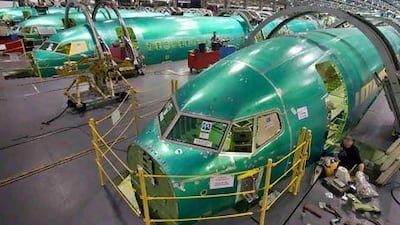has increased its forecast for aircraft demand in the Middle East to 2,340 jets worth US$390 billion over the next two decades, a rise of 40 per cent, as regional airlines squeeze market share from global rivals.
More Business news: Editor's pick of today's headlines
Last Updated: May 09, 2011
Emirates' world trade set to grow despite regional unrest
UAE exporters and importers are more cautious about the trade outlook after recent instability in the Middle East and North Africa.
Pac-Man adds punch to local TV
Middle East media companies look to capitalise on popularity of Manny Pacquiao in the region and beyond.
Dealmakers hungry for action
Industry Insights // Mergers and acquisitions activity is rising globally, but the Middle East will be playing catch-up for some time to come.
Barclays unit out of Dubai for Africa
Barclays Africa offers an ultimatum to 123 staff in Dubai, saying they must relocate as the office moves to Johannesburg or leave the bank.
Profits down at Dubai Financial Market
Dubai Financial Market, the only Gulf stock market to sell shares to the public, said first-quarter profit dropped 95.9 per cent from the same period last year.
The US aircraft maker will do battle with Airbus for its share of the Dh1.43 trillion of business as Gulf states pour billions of dollars into airport developments, such as Dubai's two international airports, to expand capacity and become major international hubs for traffic between Asia, Africa and the West.
The increase represents an additional 630 jet sales from Boeing's forecast last year, when it estimated 1,710 sales up until 2029. Boeing has a market share of almost 50 per cent in the region and worldwide, just behind its European rival Airbus.
According to Boeing's analysis, the Middle East and North Africa (Mena) is becoming the world capital of high-density, long-haul jets such as the Airbus A380 and Boeing 777 because of Emirates Airline, Qatar Airways and Etihad Airways.
Thanks to these three carriers, one in every two Middle East jets is a wide-body, compared with the global average of one in four.
Randy Tinseth, the vice president of marketing at Boeing Commercial Airplanes, said the Gulf carriers' position allowed them to enjoy the benefits of economic growth in Asia, Europe and the Middle East.
As they rapidly build their fleets, Mr Tinseth said their key locations and lower costs would lead to diminishing market share for Asian and European airlines.
"These airlines are growing market share, and one of the ways they are doing this is by taking market share on both sides [in Asia and Europe]," he said.
Although the region's young budget airline sector accounts for less than 5 per cent of regional capacity, in mature markets such as the US and Europe, budget carriers represent between 30 and 40 per cent of all traffic.
The expected liberalisaton of Middle East aviation ownership and operating rules is expected to clear the way for budget start-ups, while current heavyweights Air Arabia and flydubai continue to grow.
But Mr Tinseth acknowledged the growth had been uneven, with Sama Airlines of Saudi Arabia recently shutting down and other budget airlines still struggling for profitability.
Boeing estimates Middle East air travel will grow by an average of 7.1 per cent over the next two decades, outpacing the region's projected economic growth of 4 per cent.
"Middle East airlines have consistently led the rest of the world in traffic growth over the past two years and there is every indication that this trend will continue into the foreseeable future," Mr Tinseth said.
The global airline fleet is expected to double in size by 2029, while the Middle East's fleet is forecast to grow by 150 per cent.
Boeing's deliveries will rise in 2014 and 2015, when many of its orders for long-haul 787 and 777 planes are due to be sent to the Gulf airlines.
Airbus recently said regional unrest was heavily affecting local airlines and expected aircraft sales would be delayed or deferred by many months. But Boeing did not disclose how the four months of tension and strife in parts of the Mena region had affected its long-term sales outlook.
Boeing also has an air cargo rivalry with Airbus, and yesterday Mr Tinseth said business for regional carriers in the sector would grow at an annual rate of 6 per cent until 2029.

